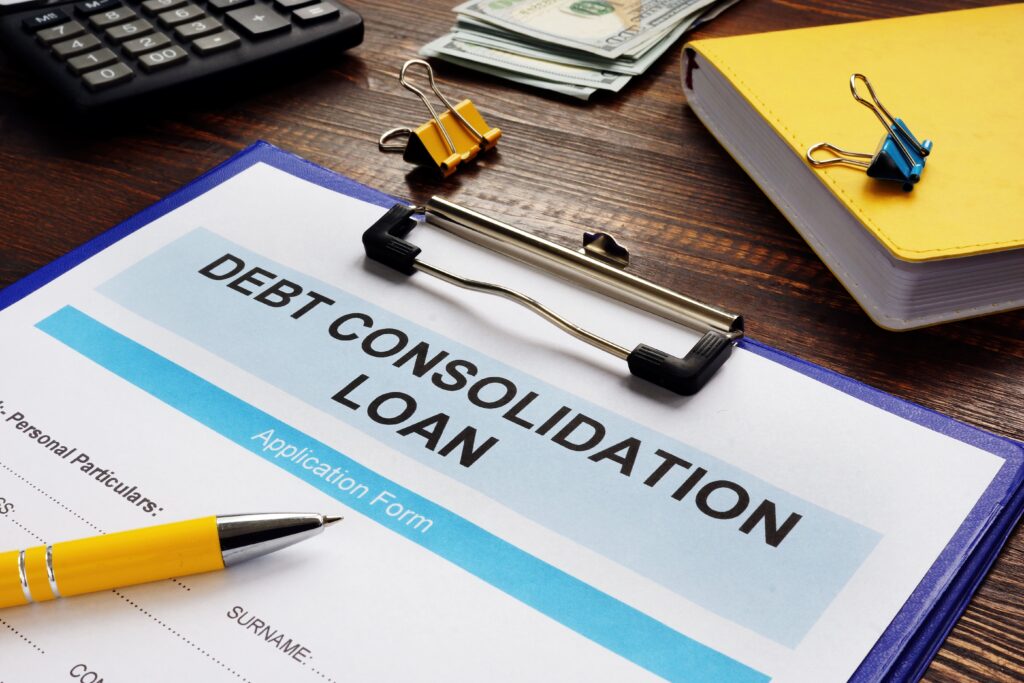Let’s talk about how debt consolidation loans work to determine if they meet your goals for saving money. Do you need help with multiple debts with different interest rates and payment due dates? A debt consolidation loan may be a viable solution for you. A debt consolidation loan allows you to combine all your outstanding debts into a single loan with a lower interest rate and a more manageable monthly payment.
However, with different types of debt consolidation loans available in the market, choosing the right one for your financial situation can take time and effort. In this article, we will discuss the best types of debt consolidation loan programs that are suitable for your needs.
What is a Debt Consolidation Loan?
A debt consolidation loan is a financial product that allows you to combine multiple debts, such as credit card debts, personal loans, medical bills, and other types of debt, into one loan. The main advantage of a debt consolidation loan is that it simplifies your finances by consolidating your debts into a single monthly payment with a lower interest rate and a longer repayment period.
Debt consolidation loans work in a straightforward manner: you secure funds to settle your debts and subsequently make a singular monthly payment to the lender. There are secured and unsecured debt consolidation programs. Consider a 2nd mortgage or a personal loan.
The benefits of debt consolidation loans often include a reduced interest rate, resulting in lower overall payments, and the convenience of a solitary payment obligation with a specified due date each month. Typically, these loans come with repayment periods ranging from 2 to 5 years, contingent upon the borrowed amount.
Shop Debt Consolidation Loans Online
Taking the initiative to explore and compare various loan offers is crucial in securing the most favorable rate for a debt consolidation loan. Since the primary purpose of a debt consolidation loan is to cut costs, ensuring that the new interest rate is lower than your existing rates is paramount. Before settling on a specific debt consolidation loan, carefully assess all available borrowing options, as some may present superior terms and advantages.
Types of Debt Consolidation Loans
Here are the best types of debt consolidation loans you should consider:
Debt Management Plan
A debt management plan is a debt consolidation program offered by credit counseling agencies. Under this program, you make a monthly payment to the credit counseling agency, which then pays your creditors on your behalf. Debt management plans typically have lower interest rates and fees than credit cards and personal loans. However, paying off your debts under this program may take longer. Please be aware that debt management is different the debt settlement negotiations.
Second Mortgage
As home prices have risen quickly in value in the last three years, more Americans are taking out 2nd mortgages to pay off their debt. A second mortgage is a secured loan that is backed by your home. It uses part of the equity that you have built in your home as its value has increased and you have paid down the mortgage.
Taking out a second mortgage to pay down debt is a popular choice. This is because you can often get a large debt consolidation loan at a low rate. One option is a home equity loan with a low, fixed-rate for a defined period. The other is a home equity line of credit or HELOC that has a variable rate and works like a credit card line. You can take out money any time you wish, up to your credit limit.
Which option is preferable? It depends on what you need the money for and how much at a time, as well as your risk tolerance. If you need a lot of money at once and prefer a fixed rate, you may want a home equity loan. However, if you prefer getting money as needed and don’t mind a variable rate, you could consider a HELOC.
Before taking out either of these loans, bear in mind that you are putting your house on the line when you have a second mortgage. As long as you pay the loan on time, getting a second mortgage could be the best choice. If a borrower doesn’t run up additional credit card debt, they can benefit from high credit scores with a debt consolidation loan.
Debt Consolidation Loan
A debt consolidation loan is a personal loan that can be a wise way to reduce your debt if you can qualify for a low rate. The loan is unsecured, so the rate and how much you can borrow depend on your FICO score. The rate on the loan is higher than for a second mortgage, but it could be a lot lower than a credit card. However, you need excellent credit and you could have considerable origination fees to pay. Also, watch for scammers promoting low rate debt consolidation loans; make sure your provider is an accredited and well-known loan provider. We will help you shop for the best loans from trusted debt consolidation companies.
Peer-to-Peer Lending
This is another way you can access money for a debt consolidation loan. You can get a peer-to-peer loan from Peerform and others where you might be able to consolidate your debt into a low-interest payment with an investor who is willing to loan the money if they get a fair interest rate.
Balance Transfer Credit Card
If you have good credit, you might qualify for a zero interest credit card for 12 to 18 months. This can allow you to transfer your balance from a high interest card and save thousands in interest every year. You will need a credit card that has a high enough limit to handle your balance. Also, be sure that you pay off the balance or transfer it before the promotional period ends or you will get socked with a lot of interest at once.
Owned Vehicle Equity
Do you have a car in good condition that is paid off or has a low balance? You could take out a personal loan with your car as collateral and you could pay down high interest credit cards. Because the loan is secured, you can usually get a lower rate.
The downside is you only can borrow as much as the vehicle is worth. You also must have car insurance on the vehicle when you have a loan on it. However, this is an interesting way to access capital at a lower rate to pay off higher-interest debt.
Borrow From Retirement Plan
If you have an IRA or 401k, you might be able to borrow some of the money to pay off credit cards. Not every company will let you do this, but if it does, you might be able to borrow $50,000 or 50% of your vested balance, whichever is less. You have five years to pay it back, and you can expect to pay a rate of prime plus 1%.
You also can pull money out of the tax-deferred plan but there is a downside. If you are less than 59.5, you pay a 10% penalty on taking money out. However, you can withdraw the money from a Roth IRA and not pay a tax penalty. Either way, however, you are reducing what you have for retirement.
How to Choose the Right Debt Consolidation Loan?

Choosing the right debt consolidation loan can help you save money and simplify your finances. Here are some factors you should consider when choosing a debt consolidation loan:
Interest Rates
Make sure you compare the interest rates of different debt consolidation loans. Choose a loan with a lower interest rate than your current debts to save on interest charges.
Fees
Check the fees associated with the loan, such as origination fees, prepayment penalties, and late fees. Choose a loan with lower fees to minimize your costs.
Repayment Terms
Choose a loan with a repayment term that fits your budget and financial goals. A longer repayment term may result in lower monthly payments, but you will pay more interest charges over time.
Eligibility Criteria
Check the loan eligibility criteria, such as credit score requirements and debt-to-income ratio. Make sure you meet the requirements before applying for the loan to avoid rejections that can hurt your credit score.
Upon receiving your application, the lender typically scrutinizes the details and conducts a hard inquiry into your credit report. Your debt-to-income ratio (DTI), which assesses your total monthly debt payments relative to your monthly income, is likely to be considered. While lenders generally prefer DTIs below 36%, many are willing to approve debt consolidation loans for applicants with higher levels of debt.
Customer Reviews
Read customer reviews and ratings of the lender and the loan product to gauge their reliability and customer service. Choose a lender with positive reviews and ratings to ensure a smooth and stress-free debt consolidation experience.
Type of Debt Consolidation Loans Summary
This article makes it clear there are several ways you can consolidate your debt or pay it off. Some of the options are secured loans with a lower interest rate while others have higher rates. If you have a lot of home equity, you should strongly consider taking out a second mortgage to pay down debt, as long as you don’t use it as an opportunity to run up your credit cards again. If you cannot avoid that temptation, you might consider an unsecured debt consolidation loan or borrowing money from a retirement plan, as long as you pay it back.
Are you interested in a type of Debt Consolidation Loan? Contact us today for more information!
Debt Consolidation FAQs
Can I use a debt consolidation loan to pay off my student loans?
Yes, you can use a debt consolidation loan to pay off your student loans and other types of debt.
Can I apply for a debt consolidation loan with bad credit?
Some lenders offer debt consolidation loans for bad credit, but they may come with higher interest rates and fees.
Can I apply for multiple debt consolidation loans at once?
Applying for multiple debt consolidation loans at once is not recommended, as it can hurt your credit score and lower your chances of approval.
How long does it take to pay off a debt consolidation loan?
The repayment period of a debt consolidation loan depends on the type of loan and the repayment terms you choose. It can range from a few months to several years.
Can debt consolidation loans affect my credit score?
Applying for a debt consolidation loan can temporarily lower your credit score. Still, making timely payments and managing your debt responsibly can improve your credit score over time.
